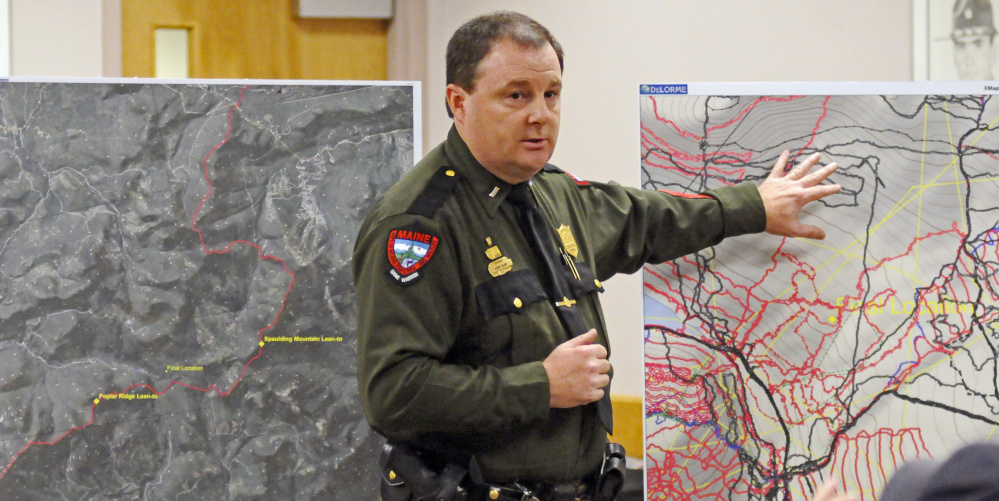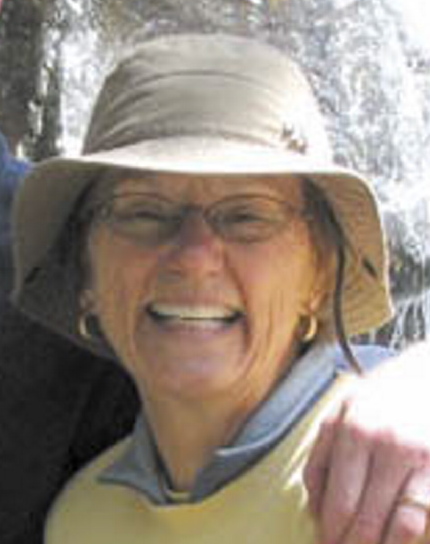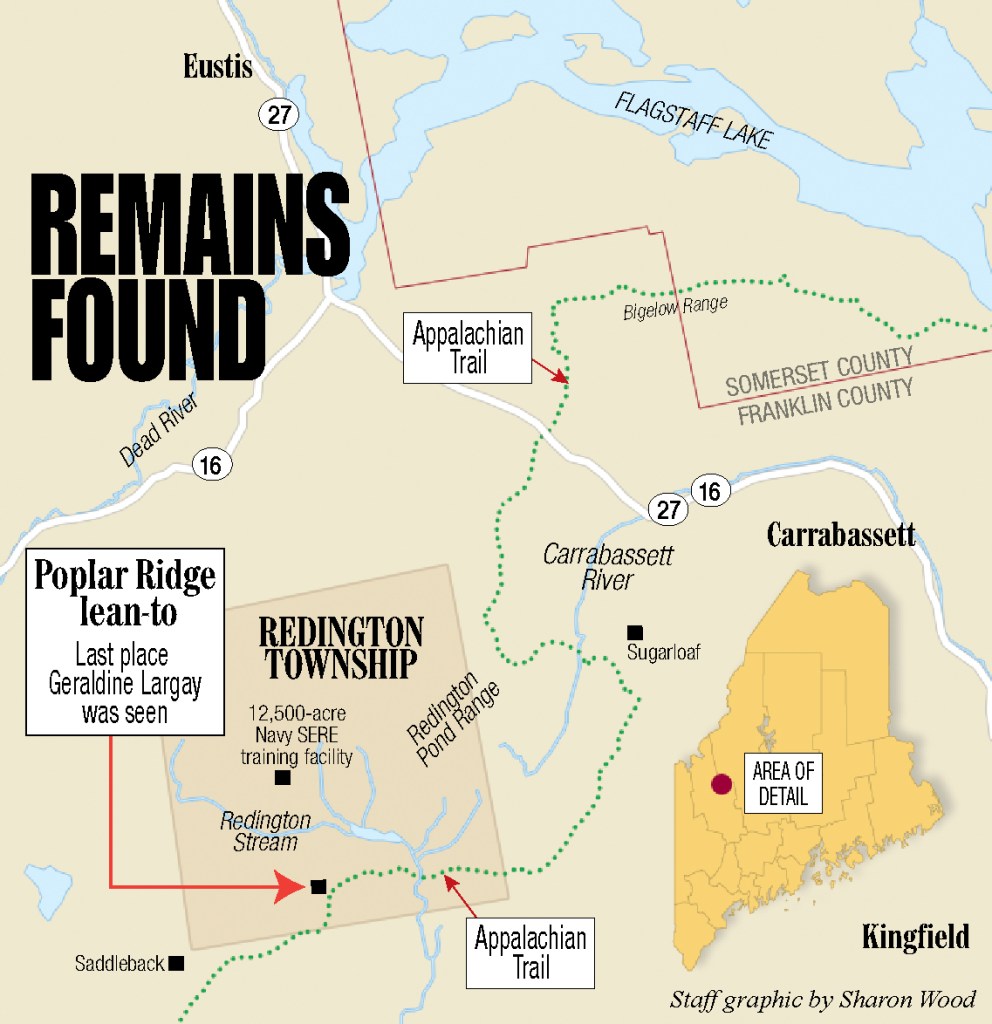AUGUSTA — The Maine Warden Service believes it has found the remains of an Appalachian Trail thru-hiker who has been missing for more than two years and doesn’t suspect her death resulted from foul play.
The skeletal remains of Geraldine Largay were found Wednesday in a wooded area about 3,000 yards off the trail two or three miles from where she was last seen in July 2013, authorities said Friday. While the remains haven’t been identified officially, Lt. Kevin Adam of the Maine Warden Service said they are confident it is Largay because of the location and the belongings that also were found.
The state medical examiner’s office will inspect the remains, and an official identification and cause of death are expected in the coming weeks. Although foul play isn’t suspected, that could change depending on the medical examiner’s report, Adam said Friday.
The remains were found Wednesday by a contractor doing a forestry survey on property owned by the Navy in Redington Township.
Three dog searches were done in the area – which is tough to traverse because of dense forest debris – including one last month that came within 100 yards of where the skeletal remains were found, Adam said.
“Why didn’t they locate her? We don’t know at this time,” he said of the dog crew that came close to the remains. “It’s a team; it’s one of our resources. We typically like to run grid searches behind the K-9s, but because of the terrain, because we didn’t have enough trained, physically fit people, we couldn’t do that in a lot of cases.”
Largay, 66, of Brentwood, Tennessee, was last seen alive on July 22, 2013, at the Poplar Ridge lean-to. She was less than 200 miles from completing the 900-plus mile second half of the trail that she began in West Virginia months earlier. She was scheduled to meet her husband, George Largay, on July 23 in Wyman Township to pick up food and supplies, but she never showed up.
She was reported missing July 24, 2013, spurring an extensive search. Her disappearance puzzled searchers and attracted national media attention, and Friday the warden service called it “one of Maine’s most unique and challenging search-and-rescue incidents.”
The Largay family is not commenting on the discovery, according to the warden service, but did express gratitude to all the searchers and investigators who worked on the search. David Fox, a friend of the family who in the past has acted as a spokesman, did not return calls for comment Friday.
During a news conference Friday at the Department of Public Safety in Augusta, Adam said authorities had been waiting for a resolution for a long time.
“It’s a happy-sad day,” he said. “Happy because we found her, but it’s also a sad day for the family with the realization that their loved one is deceased.”
Redington Township is roughly between Rangeley and Carrabassett Valley, a little more than halfway through Maine’s 282 miles of Appalachian Trail.
Search efforts over the last two years covered a roughly 23-mile area between the lean-to where Largay was last seen to Wyman Township.
The search for Largay was scaled back in August 2013, but the warden service had continued to look for her over the last two years. Periodic searches have been done since the extensive search was scaled back.
The area where the remains were found contains difficult terrain, both for hikers and searchers.
“You can be walking along and fall into a hole up to your waist,” Adam said, because there is decades of forest debris covering the land. He said they were “very lucky” none of the searchers was hurt.
RESTRICTED AREA
The Navy has a Survival, Evasion, Resistance and Escape School connected with the Portsmouth Naval Shipyard on 12,500 acres — or 19.5 square miles — in 42-square-mile Redington Township. The spot where Largay was found was not far inside the Navy property.
Adam said Friday that the Navy land is clearly marked as being off limits and is fenced off in some sections, though not in the remote area where the remains were found. Agents with the Naval Criminal Investigative Service, or NCIS, became involved when the remains were found Wednesday. Navy officials were “very helpful” in allowing searches on the federal land and offering their knowledge of the surrounding terrain, Adam said.
Stacey Vorous, who owns The Farmhouse, a hostel in Rangeley that is popular with AT hikers, said the Navy is vigilant about trespassers.
“No one is allowed on that property,” she said. “They’re really protective of that area. Hikers that wander there usually get escorted off and driven 20 miles away, whether they just want to jump back on the trail or not.”
The day after she was last seen featured torrential rain, and concerns at the time were she was turned around on the trail, or had difficulty at the Carrabassett River crossing beyond where she was last seen.
Much of the surrounding area, including that leading up to where Largay was seen last, is notoriously rugged and tough to hike in, said Bill Meyerhofer, a registered Maine Guide who grew up in the area and helped with the search in 2013.
“That’s probably some of the roughest terrain there is,” Meyerhofer said. The surrounding mountains have thick woods and steep rocky cliffs, and it only takes a few missteps to get hurt or disoriented, he said.
“You can get turned around in there in a heartbeat,” he said.
HIKING PERILS
Several trail hikers wondered how she got that far off the trail.
“It’s just trail,” Zach Cherry, a 29-year-old thru-hiker from Georgia, said Friday of the stretch of the AT where Largay disappeared. “There’s nothing weird.”
Andrea Deyling, 41, another thru-hiker, said, “The trail is well-marked and there’s nothing different about this section from the other 2,000 miles, and it’s surprising. You wouldn’t think of something like this happening.”
But Cherry said the weather could have made a difference.
“I will say this: The direction she was going, she came over Saddleback, which is a pretty big mountain; and there’s exposed ridge line for 1.4 miles. The back side is steep, and if there were bad weather or she was in bad shape or hypothermic, that could explain why she was found not on the trail and was somewhere else, maybe trying to get help.”
Crime reported on the Appalachian Trail in Maine is rare, and according to the warden service, 98 percent of hikers reported missing are found within 24 hours.
George Largay had followed his wife along the way, meeting her at crossroads to replenish his wife’s supplies, and has said in interviews that the trek was a lifelong dream.
She had hiked the first half of the trail, from Georgia to West Virginia, previously. She was called “Gerry” by family and known by the trail name was “Inchworm.”
“She loved camping. She loved outdoors,” George Largay said in an interview with The Tennessean newspaper. “The ultimate hike for someone who really loves hiking as she does is the Appalachian Trail.”
Largay’s family had been offering a $25,000 reward for information about her disappearance. Adam, of the warden service, said authorities would give the name of the contractor who found the remains to the Largay family, and they would decide about the reward money.
Adam said the case’s outcome this week was in line with what the warden service expected.
“We felt all along that she somewhere got off the trail,” he said. “She was in a remote wooded area and we just needed to get the right resource in there.”
Morning Sentinel Staff Writer Peter McGuire contributed to this report.
Copy the Story LinkSend questions/comments to the editors.






Success. Please wait for the page to reload. If the page does not reload within 5 seconds, please refresh the page.
Enter your email and password to access comments.
Hi, to comment on stories you must . This profile is in addition to your subscription and website login.
Already have a commenting profile? .
Invalid username/password.
Please check your email to confirm and complete your registration.
Only subscribers are eligible to post comments. Please subscribe or login first for digital access. Here’s why.
Use the form below to reset your password. When you've submitted your account email, we will send an email with a reset code.